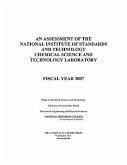- Broschiertes Buch
- Merkliste
- Auf die Merkliste
- Bewerten Bewerten
- Teilen
- Produkt teilen
- Produkterinnerung
- Produkterinnerung
Develops a useful framework for thinking about the American approach to shaping and managing scientific innovation. This book suggests that the history of science, technology, and politics is best understood as a negotiation of ongoing tensions between open and closed systems.
Andere Kunden interessierten sich auch für
![Genetics: Science, Ethics, and Public Policy Genetics: Science, Ethics, and Public Policy]() Genetics: Science, Ethics, and Public Policy46,99 €
Genetics: Science, Ethics, and Public Policy46,99 €![An Assessment of the National Institute of Standards and Technology Chemical Science and Technology Laboratory An Assessment of the National Institute of Standards and Technology Chemical Science and Technology Laboratory]() National Research CouncilAn Assessment of the National Institute of Standards and Technology Chemical Science and Technology Laboratory24,99 €
National Research CouncilAn Assessment of the National Institute of Standards and Technology Chemical Science and Technology Laboratory24,99 €![Science and Technology Leadership in American Government Science and Technology Leadership in American Government]() Institute Of MedicineScience and Technology Leadership in American Government45,99 €
Institute Of MedicineScience and Technology Leadership in American Government45,99 €![Frontiers of Illusion Frontiers of Illusion]() Daniel SarewitzFrontiers of Illusion41,99 €
Daniel SarewitzFrontiers of Illusion41,99 €![American Technology Policy American Technology Policy]() J D Kenneth BoutinAmerican Technology Policy26,99 €
J D Kenneth BoutinAmerican Technology Policy26,99 €![A Critical Appraisal of Government Research Policy A Critical Appraisal of Government Research Policy]() Philip Hauge AbelsonA Critical Appraisal of Government Research Policy16,99 €
Philip Hauge AbelsonA Critical Appraisal of Government Research Policy16,99 €![General Research Support; a General Policy and Information Statement General Research Support; a General Policy and Information Statement]() General Research Support; a General Policy and Information Statement16,99 €
General Research Support; a General Policy and Information Statement16,99 €-
-
-
Develops a useful framework for thinking about the American approach to shaping and managing scientific innovation. This book suggests that the history of science, technology, and politics is best understood as a negotiation of ongoing tensions between open and closed systems.
Hinweis: Dieser Artikel kann nur an eine deutsche Lieferadresse ausgeliefert werden.
Hinweis: Dieser Artikel kann nur an eine deutsche Lieferadresse ausgeliefert werden.
Produktdetails
- Produktdetails
- Verlag: Rutgers University Press
- None edition
- Seitenzahl: 352
- Erscheinungstermin: 20. Juni 2006
- Englisch
- Abmessung: 233mm x 156mm x 22mm
- Gewicht: 475g
- ISBN-13: 9780813538273
- ISBN-10: 0813538270
- Artikelnr.: 22461696
- Herstellerkennzeichnung
- Libri GmbH
- Europaallee 1
- 36244 Bad Hersfeld
- gpsr@libri.de
- Verlag: Rutgers University Press
- None edition
- Seitenzahl: 352
- Erscheinungstermin: 20. Juni 2006
- Englisch
- Abmessung: 233mm x 156mm x 22mm
- Gewicht: 475g
- ISBN-13: 9780813538273
- ISBN-10: 0813538270
- Artikelnr.: 22461696
- Herstellerkennzeichnung
- Libri GmbH
- Europaallee 1
- 36244 Bad Hersfeld
- gpsr@libri.de
Sylvia Kraemer earned her Ph.D. in history from Johns Hopkins University and later served in various policy capacities for NASA, including chief historian and represented the agency during the Clinton Administration's development of national space policy. She has also taught science and technology policy at George Mason University and Colby College. She lives in Charlottesville, Virginia.
Contents
Preface
Chapter 1.
Introduction: Open Systems
Chapter 2.
Technology and the Ideology of Free Markets
An Open System for the New Republic
A National and Open Commercial System.
Technological Innovation in "One Great American System"
Technology: A Critical Role in Economic Productivity
Chapter 3.
The Ideologies of Science
The Bush Report
The Ideology of Science
Creating the National Science Foundation: A Closed System at Bay
A Partial Victory for The Bush Paradigm: The National Academy of Sciences
Chapter 4.
The Science and Technology Policy Toolkit
General Observations
The Toolkit
Mission Agencies
Intra-mural Laboratories
Federally Funded Research and Development Centers
National Infrastructure and Regulatory Agencies
Targeted Programs.
Federal Procurement Policy
Priority and Profits: U.S. Patent Policy
The Broadened Scope of Patentability
Federally Funded Inventions
International Harmonization of Patent Laws
Chapter 5.
Science, Technology and Political Authority
Science and Engineering in Federal Courts
The Government Performance and Results Act (GPRA): Governing by Numbers
Scientific and Technical Data under the Freedom of Information Act
Reliable Information, Peer Review, and Federal Regulatory Policy
Federal Advisory Committees: An Alternate Route to Power
Chapter 6.
Open Systems in a Digital World
Cyberspace As An Open System
The First and Fourth Amendments in Cyberspace
Freedom of Speech
The Fourth Amendment.
Federal Regulation of Internet Highways
Monopoly Power in the Software Industry
Chapter 7.
Open Systems in Outer Space
Creatures of the Cold War: NASA and U.S. Space Policy
A Costly Aberration: Man on the Moon
Commercialization: Demobilization by Other Means
U.S. Space Policy in the Dawn of the 21st Century
Chapter 8.
The Crisis in American Health Care
Expert Authority
Feeding the Leviathan
Health Care Reform
The Promise and Perils of Biomedicine
A $100 Billion Pharmacopoeia and Too Little Flu Vaccine
Commercializing Biomedical Research: Open Systems in Conflict
Chapter 9.
Fossil Fuels and Clean Air
Nature as an Open System and the Foundations of U.S. Energy Policy
Energy Supply and Demand: Policy and Paradoxes
Environmental Policy and the True Costs of Fossil Fuels
Chapter 10:
Epilogue
Appendix: Essay on Sources
Notes
Index
Preface
Chapter 1.
Introduction: Open Systems
Chapter 2.
Technology and the Ideology of Free Markets
An Open System for the New Republic
A National and Open Commercial System.
Technological Innovation in "One Great American System"
Technology: A Critical Role in Economic Productivity
Chapter 3.
The Ideologies of Science
The Bush Report
The Ideology of Science
Creating the National Science Foundation: A Closed System at Bay
A Partial Victory for The Bush Paradigm: The National Academy of Sciences
Chapter 4.
The Science and Technology Policy Toolkit
General Observations
The Toolkit
Mission Agencies
Intra-mural Laboratories
Federally Funded Research and Development Centers
National Infrastructure and Regulatory Agencies
Targeted Programs.
Federal Procurement Policy
Priority and Profits: U.S. Patent Policy
The Broadened Scope of Patentability
Federally Funded Inventions
International Harmonization of Patent Laws
Chapter 5.
Science, Technology and Political Authority
Science and Engineering in Federal Courts
The Government Performance and Results Act (GPRA): Governing by Numbers
Scientific and Technical Data under the Freedom of Information Act
Reliable Information, Peer Review, and Federal Regulatory Policy
Federal Advisory Committees: An Alternate Route to Power
Chapter 6.
Open Systems in a Digital World
Cyberspace As An Open System
The First and Fourth Amendments in Cyberspace
Freedom of Speech
The Fourth Amendment.
Federal Regulation of Internet Highways
Monopoly Power in the Software Industry
Chapter 7.
Open Systems in Outer Space
Creatures of the Cold War: NASA and U.S. Space Policy
A Costly Aberration: Man on the Moon
Commercialization: Demobilization by Other Means
U.S. Space Policy in the Dawn of the 21st Century
Chapter 8.
The Crisis in American Health Care
Expert Authority
Feeding the Leviathan
Health Care Reform
The Promise and Perils of Biomedicine
A $100 Billion Pharmacopoeia and Too Little Flu Vaccine
Commercializing Biomedical Research: Open Systems in Conflict
Chapter 9.
Fossil Fuels and Clean Air
Nature as an Open System and the Foundations of U.S. Energy Policy
Energy Supply and Demand: Policy and Paradoxes
Environmental Policy and the True Costs of Fossil Fuels
Chapter 10:
Epilogue
Appendix: Essay on Sources
Notes
Index
Contents
Preface
Chapter 1.
Introduction: Open Systems
Chapter 2.
Technology and the Ideology of Free Markets
An Open System for the New Republic
A National and Open Commercial System.
Technological Innovation in "One Great American System"
Technology: A Critical Role in Economic Productivity
Chapter 3.
The Ideologies of Science
The Bush Report
The Ideology of Science
Creating the National Science Foundation: A Closed System at Bay
A Partial Victory for The Bush Paradigm: The National Academy of Sciences
Chapter 4.
The Science and Technology Policy Toolkit
General Observations
The Toolkit
Mission Agencies
Intra-mural Laboratories
Federally Funded Research and Development Centers
National Infrastructure and Regulatory Agencies
Targeted Programs.
Federal Procurement Policy
Priority and Profits: U.S. Patent Policy
The Broadened Scope of Patentability
Federally Funded Inventions
International Harmonization of Patent Laws
Chapter 5.
Science, Technology and Political Authority
Science and Engineering in Federal Courts
The Government Performance and Results Act (GPRA): Governing by Numbers
Scientific and Technical Data under the Freedom of Information Act
Reliable Information, Peer Review, and Federal Regulatory Policy
Federal Advisory Committees: An Alternate Route to Power
Chapter 6.
Open Systems in a Digital World
Cyberspace As An Open System
The First and Fourth Amendments in Cyberspace
Freedom of Speech
The Fourth Amendment.
Federal Regulation of Internet Highways
Monopoly Power in the Software Industry
Chapter 7.
Open Systems in Outer Space
Creatures of the Cold War: NASA and U.S. Space Policy
A Costly Aberration: Man on the Moon
Commercialization: Demobilization by Other Means
U.S. Space Policy in the Dawn of the 21st Century
Chapter 8.
The Crisis in American Health Care
Expert Authority
Feeding the Leviathan
Health Care Reform
The Promise and Perils of Biomedicine
A $100 Billion Pharmacopoeia and Too Little Flu Vaccine
Commercializing Biomedical Research: Open Systems in Conflict
Chapter 9.
Fossil Fuels and Clean Air
Nature as an Open System and the Foundations of U.S. Energy Policy
Energy Supply and Demand: Policy and Paradoxes
Environmental Policy and the True Costs of Fossil Fuels
Chapter 10:
Epilogue
Appendix: Essay on Sources
Notes
Index
Preface
Chapter 1.
Introduction: Open Systems
Chapter 2.
Technology and the Ideology of Free Markets
An Open System for the New Republic
A National and Open Commercial System.
Technological Innovation in "One Great American System"
Technology: A Critical Role in Economic Productivity
Chapter 3.
The Ideologies of Science
The Bush Report
The Ideology of Science
Creating the National Science Foundation: A Closed System at Bay
A Partial Victory for The Bush Paradigm: The National Academy of Sciences
Chapter 4.
The Science and Technology Policy Toolkit
General Observations
The Toolkit
Mission Agencies
Intra-mural Laboratories
Federally Funded Research and Development Centers
National Infrastructure and Regulatory Agencies
Targeted Programs.
Federal Procurement Policy
Priority and Profits: U.S. Patent Policy
The Broadened Scope of Patentability
Federally Funded Inventions
International Harmonization of Patent Laws
Chapter 5.
Science, Technology and Political Authority
Science and Engineering in Federal Courts
The Government Performance and Results Act (GPRA): Governing by Numbers
Scientific and Technical Data under the Freedom of Information Act
Reliable Information, Peer Review, and Federal Regulatory Policy
Federal Advisory Committees: An Alternate Route to Power
Chapter 6.
Open Systems in a Digital World
Cyberspace As An Open System
The First and Fourth Amendments in Cyberspace
Freedom of Speech
The Fourth Amendment.
Federal Regulation of Internet Highways
Monopoly Power in the Software Industry
Chapter 7.
Open Systems in Outer Space
Creatures of the Cold War: NASA and U.S. Space Policy
A Costly Aberration: Man on the Moon
Commercialization: Demobilization by Other Means
U.S. Space Policy in the Dawn of the 21st Century
Chapter 8.
The Crisis in American Health Care
Expert Authority
Feeding the Leviathan
Health Care Reform
The Promise and Perils of Biomedicine
A $100 Billion Pharmacopoeia and Too Little Flu Vaccine
Commercializing Biomedical Research: Open Systems in Conflict
Chapter 9.
Fossil Fuels and Clean Air
Nature as an Open System and the Foundations of U.S. Energy Policy
Energy Supply and Demand: Policy and Paradoxes
Environmental Policy and the True Costs of Fossil Fuels
Chapter 10:
Epilogue
Appendix: Essay on Sources
Notes
Index








